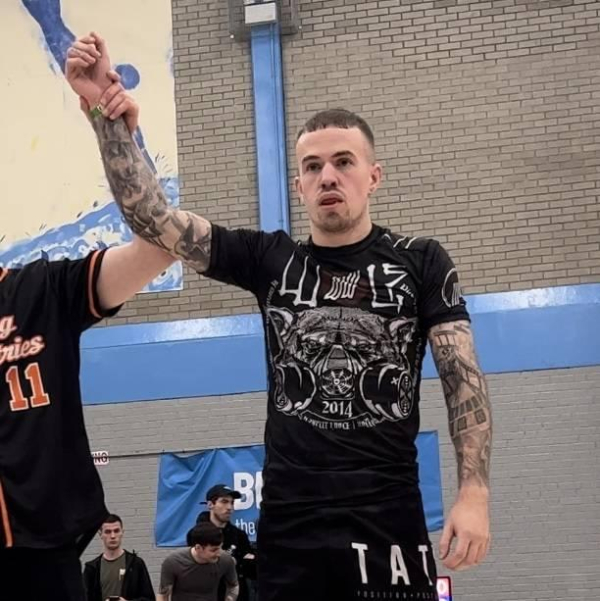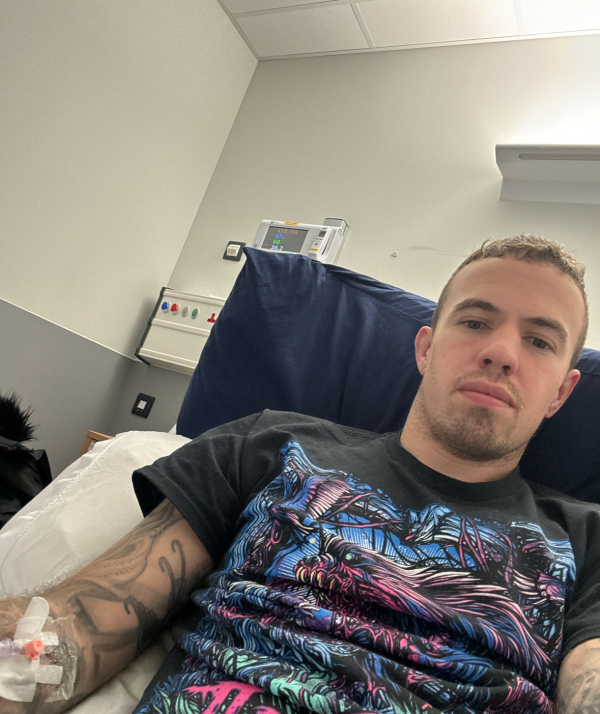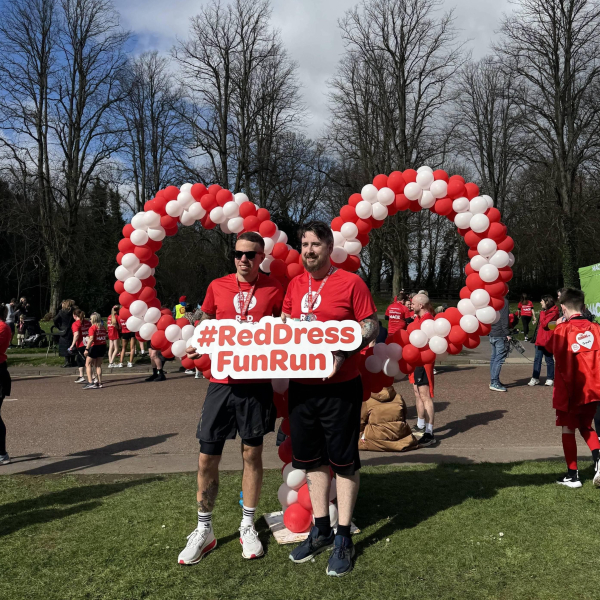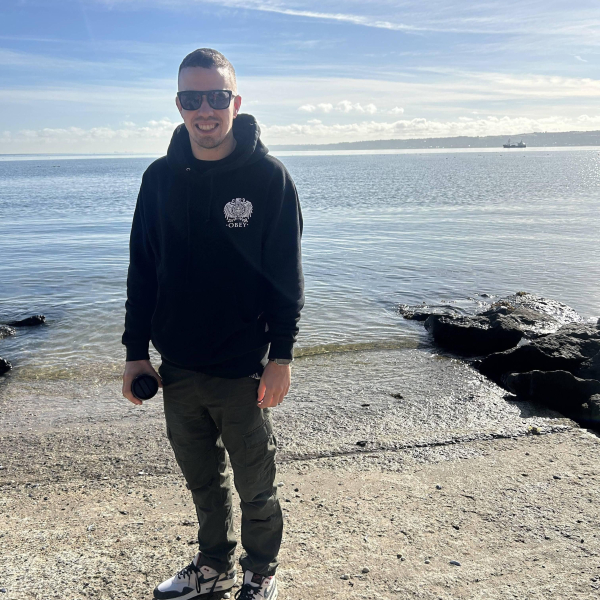
World Stroke Day will be marked on Wednesday (29th October) and leading local health charity, Northern Ireland Chest Heart & Stroke (NICHS), is using the day to put a spotlight on this serious, often life changing, condition.
Matt Donnelly, from Newtownabbey, had a sudden stroke last year at just 33 years old and he is speaking out to raise awareness that stroke is not something that only affects older people, it can happen to anyone, at any age.
Matt recalls; “I had no prior health issues or warning signs that I might be at risk of a stroke. I was fit and healthy and trained in Brazilian Jiu Jitsu. I had a flu the week before the stroke and the first time I went back to training after that I felt dizzy, but I thought it was just down to not having been well. By the end of the training session, I really didn’t feel right but packed up my stuff and drove home. I kind of felt drunk but it being a stroke never entered my mind, especially at my age.”
“When I got home, I went to bed, hoping I would feel better the next day. When I got up the following morning I went to go downstairs and felt like I was really drunk, dizzy and unbalanced. I wondered if it was a concussion as I had similar stuff happen before from training, but I hadn’t hit my head. I didn't know what was going on.”

“I started to get ready for work, but I was feeling confused, and the drunk feeling was getting worse. I also had slow speech. My partner said we should go to A&E but neither of us thought it could be a stroke.”
Matt went to Antrim Area Hospital A&E where he had a CT scan which didn’t highlight anything untoward. An MRI scan was then done, and that showed Matt had suffered a brain stem stroke. He says; “The doctor told me it was lucky I came to hospital when I did. Treatment wise I was put on blood thinners and was discharged after five days in hospital to start my recovery journey.”
“I am sharing my story to make people aware strokes can happen to anyone, at any age and that symptoms don’t always follow the classic FAST acronym. My main symptoms were dizziness and being unbalanced. When it first happened, it felt like room-spinning dizziness, it was really bad then got a bit better, but I still felt off balance. The next day the dizziness wasn’t the same room-spinning feeling but one of being completely unbalanced, to the point it was hard to stand up.”
“After I was discharged balance was still an issue for me. I felt like I was on a rocking boat all the time. I also had right sided weakness in my arm and coordination issues, but those resolved themselves after about two weeks thankfully. I was lucky that way although I didn’t think about the weakness and coordination problems too much as my balance was such a big issue for me.”
“I'm a guitarist and it wasn’t until I went to pick up my guitar after getting home from hospital that I noticed the weakness and coordination issues. I couldn't even hit the strings my coordination was so far off. That was hard to deal with. I went away for a couple of days and then thought, ‘I’m going to have to try and relearn this’, and I picked up my guitar and thank goodness was able to play it.”
“At that point I didn't really know much about stroke. I just assumed that within a couple of days or weeks I would be back to being as right as rain. That was a bit of a shock whenever I picked up the guitar and couldn’t play it, I had the realisation that things weren’t working how they used to work.”
Talking about his post hospital treatment Matt says; “I was assessed for statutory physiotherapy a few weeks after I got home but my arm was pretty much back to normal by that stage and balance issues weren’t something they focussed on so they couldn't actually offer me anything. It was left in my own hands to research what I could be doing to help improve my balance, so I followed some rehab programmes myself and then went to a private neuro-physiotherapist which really helped. After about four months of doing exercises three times a day every day I got near enough back to normal.”

Somewhere Matt did get good support from was local charity Northern Ireland Chest Heart & Stroke (NICHS) as he explains; “I was referred to NICHS by the hospital and was contacted by Darren, one of the Care Services Coordinators. Darren came out to see me at home and explained about the charity’s Family Support Service which offers both practical and emotional support. Darren kept in close contact, checking in with me and I found that really helpful.”
“The impact of a stroke isn’t always physically visible; there is a huge mental impact too. You think ‘why on earth did that happen?’ I'm young, I'm fit, I'm healthy and it just hit me completely out of the blue. That’s hard to deal with. The worst thing for me was when people would say ‘it doesn't look like you have had a stroke’. People would even say things like that to me when I was in hospital and I was lying there thinking, ‘I can’t get out of bed. I’m 33, I’ve had a stroke, this is everyone’s worst nightmare’.”
“It was a bit of a double-edged sword for me. I recovered well and wasn’t left with impacts like some other people, but on the other hand, what I went through was still massive. I had a stroke at such a young age. What I went through was still as valid as others’ experiences, but it can be hard to keep that perspective at times as I do feel like I have come off a lot better than others do. Darren understood all that and it really helped having someone I could talk to. I actually did NICHS’s Red Dress Fun Run back in February as a thank you for the help and support I’ve received.”

Matt continues; “When you are young, fit and active, you have a bit of an invincibility feeling but then something like this happens and you realise anything could happen at any time. It’s a wakeup call nobody ever wants to get. Although there are some positives in that too. Like many other people, I probably lived too fast before. I was constantly doing something and never took time to sit down, relax and just chill out and enjoy things a bit more. Stroke forces you to do that.”
“I was off work for three months and at first it was an adjustment when you’re not used to going slower but afterwards it made me think more about getting back into hobbies I used to do, but at the time thought I had no time for. Or I spend more time socialising when before I would have thought of doing more work instead. This has showed me you need time to let your body and mind rest so slowing down a bit is no bad thing.”
“I also appreciate things a lot more and don't get so annoyed by little inconveniences because I always think, ‘a few months ago I was in no fit state to do this at all’. I’m glad that even though something might be an inconvenience, I can do it.”
Matt concludes; “I’m doing well now, I just have to learn to live with the little physical things that are a constant reminder that I’ve had a stroke. I’m young, I have so much of my life ahead of me and I can’t lie down.”
“I hope putting my story out there will make people aware that just because they are in their twenties or thirties, they aren’t immune to things like this happening. It's an old preconception that only elderly people have strokes. I would urge people, if you are worried about something, if something happens unexpectedly and you don’t feel right, get it checked out. Don’t ignore it, it’s not worth it.”
Ursula Ferguson, Director of Care Services at Northern Ireland Chest Heart & Stroke explains, “We are very grateful to Matt for sharing his story in support of World Stroke Day and our charity. Having a stroke is a life-changing reality for thousands of people in our local community every year and people may also be surprised to learn that 50% of stroke survivors in Northern Ireland are under 75.”
“World Stroke Day is timely as NICHS is currently running a stroke awareness campaign. Over the past ten years there has been a 23% increase here in the number of people registered with their GP as having had a stroke or Transient Ischemic Attack (TIA)¹, often referred to as a mini stroke. This increase is hugely worrying for the charity and through our campaign we are working to raise awareness of stroke symptoms and remind the public to act FAST if they spot any symptom of stroke:
F - Face – is it drooping on one side?
A - Arms – is their arm weakness? Can they be raised?
S - Speech - is it slurred?
T - Time to get to hospital as soon as possible.
“As Matt’s story shows however there are other symptoms to be aware of, and it is important these are not discounted. Other symptoms of stroke can include problems with balance and coordination, sudden loss of vision, numbness down one side of the body, communication problems in understanding speech, difficulty swallowing and sudden severe headache. If any of these symptoms are experienced, it is important to also seek medical attention as soon as possible.”
If you have been affected by stroke visit https://nichs.org.uk/strokesupport for further information about NICHS’s stroke support services.
